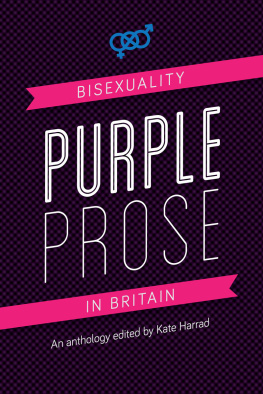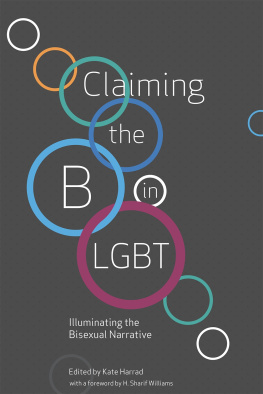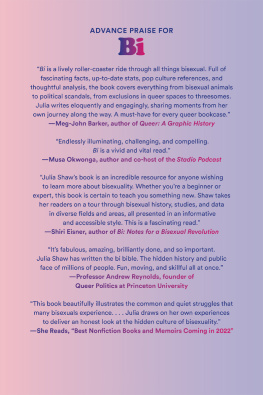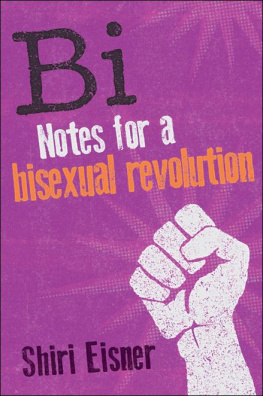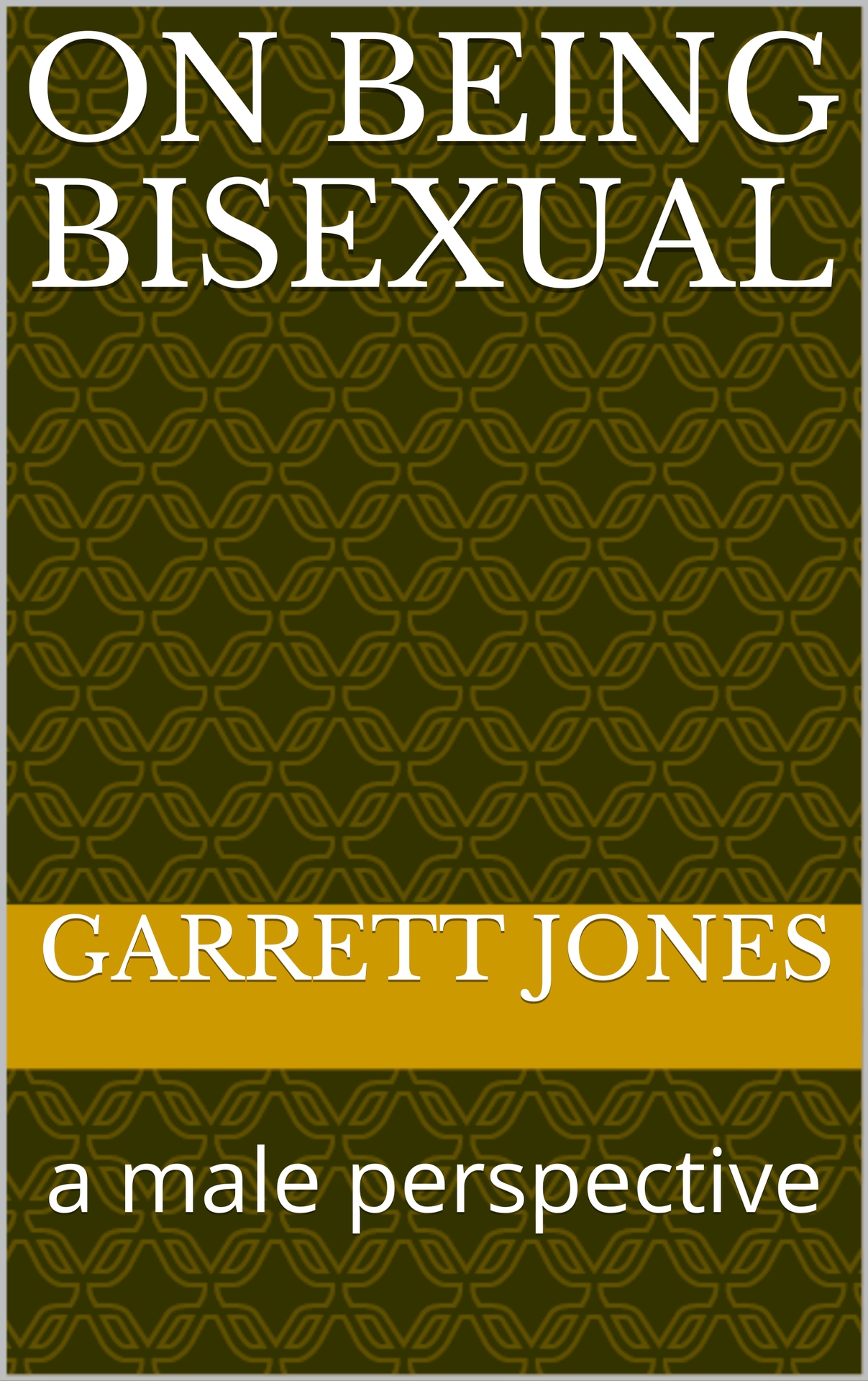ON BEING BISEXUAL
A male perspective
by
Garrett Jones
CONTENTS
1. Opening gambit 4
2 Are people really either gay or straight? 33
3 Doesnt any kind of promiscuity destabilise a relationship? 57
4 Is male homosexuality always anal? 84
5 Is a bisexual lifestyle healthy? 106
6 What is gained by living bisexually? 120
7 What are the similarities and differences between the two ways
of loving? 14
8 Can you have a viable lifestyle as a bisexual? 160
9 How long has bisexuality been around? 178
10 How has bisexuality fared more recently? 202
11 The Englishman abroad 235
12 Where do we go from here? 256
13 Getting it together 276
14 Educating for a brighter future 295
1: OPENING GAMBIT
This book is a contribution to our modern quest for greater honesty and precision about sex, both in our thinking and in our practice. It makes no attempt to be detached or clinical but draws heavily on its authors personal experience of sex and the experience of the considerable number and variety of men who have confided in him. It cannot claim professional expertise, although it draws on reasonably wide reading in this field. My main qualification for attempting a book of this kind is that I have myself enjoyed a long, happy and diverse sex life which has contributed more to my good health and sense of well-being than any other single factor. I want to share what I have learned.
Sex has always seemed to me about the most engrossing subject there is. I remember feeling this as a small boy. I knew very little about the facts of the matter but I sensed their erotic pull. I now know a good deal about the facts of the matter, but the erotic pull remains undiminished. There is nothing unusual or remarkable about this except that too many of the people I know, although there are grounds for thinking they share my enthusiasm for sex, for one reason or another, have never been able to acknowledge it, not even to themselves. Their hidden yen for sex is a guilty secret which inhibits their capacity to open up,
As a lad of six or seven, playing doctors with my big sister and her pals, I knew there was something far more exciting and fascinating about the touch and exploration of other bodies, especially the hidden bits, than I had any reason to expect; I just felt it. Now, I can view a seeming infinity of male bodies on the Net, many of them proudly exhibiting their pricks, a surprising number of them as beautiful as they are sexy, and not merely feel their erotic attraction but also account for it.
My adult experience of sex has made my childhood fascination much easier to explain. Even so, there is still an element of mystery and excitement which defies rationalisation. I have been endowed with a big head but not specially big genitals. In spite of this, I have learned not to let my head bully my balls.
Already, I have a little explaining to do.
On the linguistic front, you will notice I favour Anglo-Saxon sexual terminology. I have talked about pricks and balls and this may seem to you unwarrantably crude.
It is hardly surprising, in view of the way most of us have been reared, if you feel like this. But unless you are able to come to terms with this feeling, seeing it for what it is, prepared to spend some time allowing it to change, there would be little point in going on with this book. You would be on the wrong wavelength. This isnt a trivial matter, as I hope to demonstrate.
If we confine our attention to the male organ for the present, it must surely have occurred to you that the so-called proper term is badly out of step with our words for other body parts. We have a head, an ear, eyes, mouth, nose, legs, feet, arms, hands and so on.. When have you heard even a doctor using a variant for any of these words? Would you understand what he was talking about if he tried it?
The same applies to physical functions and activities. We walk, run, talk, rest, sleep, wake, see, hear, think, stop, go. eat, drink, feel, touch, hold, hit, strike, chat, kiss and so on.
So why are we so afraid to use the equivalent words when it comes to talking about sex - if we ever do - in polite society? The word penis is Latin and means tail, suggesting immediately we feel sheepish about mentioning it at all and can only do so by using a foreign word for a body part we dont actually have and which, even if we did, would be entirely sexless.
Another deficiency of the term penis is its failure to indicate which of its two states this organ is currently in. It is surely outrageous that a part of the body which has two quite distinct functions and which looks quite different when performing each of them should always be referred to by the same blanket term? It is as if we do not want to acknowledge the remarkable versatility of the penis, preferring to let it hang its head in shame.
Were we not conditioned to be so evasive, it would be much simpler to refer to a flaccid penis as a cock [= a tap] and an erect penis as a prick [= an organ which is stiff enough to penetrate]. True, because these words have customarily been regarded as disreputable, they have been used carelessly and often interchangeably, though I notice there is a growing tendency to use them more carefully, in the way I have just indicated, in recent novels. Age-old inhibitions are gradually being shaken off.
Another deficiency of the word penis is its extreme awkwardness in the plural. If I had agreed to be saddled with it, I should have needed, when talking about my Net-viewing just now, to talk about penises or penes, both of which are an abomination. It is probably for this reason that Dr James Docherty, in his excellent guide for children and parents about the facts of life, refers to a whole page of photographs of twinned cocks and pricks by a collective singular - 'the penis'. These photographs, incidentally, are designed to show children the various shapes and sizes in which the male organ comes and the difference between the erect and the flaccid state of the same organ. [<>see his Growing Up , Modus/Royal Society of Medicine, 1986, pp. 46f].
If, as soon as we talk to our children about sex, we feel obliged to refer to penises and vaginas, which sometimes (not too often) have sexual intercourse, we make it quite clear we feel as uncomfortable about this subject as the words sound if we dare even to use them, let alone those awful 'four-letter words'. Things are obviously not going to change in a hurry but the best route to enlightenment is to contemplate the Poet's observation that a rose by any other name would smell as sweet .
It can be argued, of course, that we do need two separate vocabularies to distinguish educative or scientific discourse about sex from pornography or titillation. The fatal flaw in this argument is that no words can rob sex of its sexiness. I remember hearing schoolboys talking sexily to each other in a swimming-pool changing room; they were using the proper terms, but not in a way their parents or teachers would have regarded as proper!
Perhaps I should also explain why I have just admitted it is male nudes which constitute my preferred viewing on the Net. This seems to indicate I am gay.
If by gay is meant that my dominant sex drive is homosexual, this is not misleading. I find sex (non-anal) with the right fellow more exciting than anything else in life. But this admission by no means ties it all up into a neat little parcel. I am also a married man with two daughters and four grandchildren - and wouldnt change that for all the world. I find sex with my wife still the most satisfying (if not always the most exciting) of experiences and I love the complementarity of living with her. I find it hard to envisage an exclusively gay lifestyle which could be as rounded or as fulfilling.


